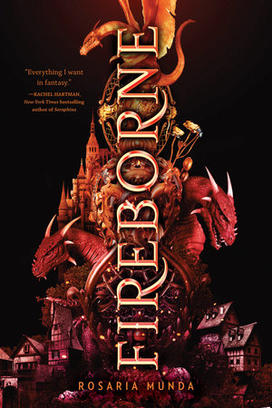Rosaria Munda ’14 Writes Young Adult Fantasy with a Classics Twist
Munda’s first novel is ‘Plato’s Republic meets the French Revolution, with dragons’
Rosaria Munda ’14 taught herself Latin as a child growing up in rural North Carolina. In high school, as a scholarship student at a Rhode Island boarding school, she added Greek to her studies. So it was no surprise when she entered Princeton as an intended classics major.
But then she took a course in political theory with Professor Melissa Lane, and she says it changed her life — in more ways than one.
Munda realized that political theory blended her academic interest in ancient languages with her personal love of fantasy novels. She was struck in particular by Plato’s Republic and its concept of “guardians,” a special class of citizens raised to be rulers from a young age.
“It seemed like a really good premise for a YA [young adult] novel,” says Munda, “but a terrible idea in practice.”Wishing to explore this contradiction, she contemplated ways to create a fictional realm based on Plato’s ideal society.
Dragons seemed a natural fit. The mythical creatures were enjoying a popular resurgence at the time, thanks to books and films like A Game of Thrones and How to Train Your Dragon. She noticed a common element in such stories — that of dragons choosing their human riders as children. Combining this trope with the rigid hierarchy of Plato’s society, she developed the idea for a fantasy world in which young dragon riders are groomed to be government leaders.
Meanwhile, in the real world, Munda made two important choices. She decided to major in politics, and she began dating Robert Stone ’14, her future husband. The two became acquainted in Lane’s course on political theory, bonding over many late lunches after class.
One evening, Munda told Stone her idea for a novel based on Plato’s Republic. He was enthusiastic, she says, encouraging her to pursue it. The following summer, when Munda was interning in Paris, she devised the setting for the book. The story would take place in a fictional nation struggling to find its footing after ousting its longtime rulers in a violent revolution.
And so, the final pitch came together: “Plato’s Republic meets the French Revolution, with dragons.”

Fireborne was released in 2019, receiving starred reviews from four major trade publications. Booklist declared it “a near-perfect work of high fantasy.” A sequel, Flamefall, came out in 2021, and the final title in the trilogy, Furysong, is due out this August.
Princeton’s fingerprints are everywhere in the series, from the Gothic architecture of the capital city to the private club where the elite students dine. And then there are the dragon sparring matches. Munda drew inspiration for these scenes from the time she spent watching her husband, Stone, compete on the Princeton fencing team.
Munda recalls feeling out of place in Princeton’s hallowed halls, a trait she shares with Annie, one of the young dragon riders in her books. She confronted lingering traces of imposter syndrome as she navigated the publishing industry, but through it all, she held steady to one conviction: “I knew I wanted to be published, and this was the story I wanted to tell.”












No responses yet